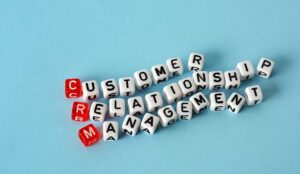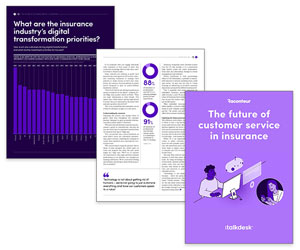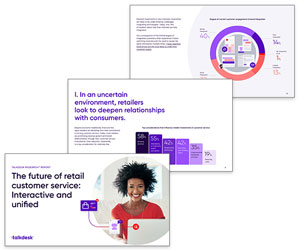CRM used to be the flavour of the month, but of late it has fallen from grace. Richard Snow looks at the future of CRM and where it goes from here.
Before discussing the future of CRM, first you have to define what it is and, believe me, that is not as easy as it seems. In fact, if you follow some of the active discussions on LinkedIn, you might well come away more confused than when you started.
Two in particular grabbed my attention: “Who should own CRM?” and “Why do Sales hate CRM?”.
The first ended up going to the heart of my question – “is CRM a philosophy, strategy, concept or just a system?” Without giving full justice to the debate, the majority come down on the side that it is a system.
Why do Sales hate CRM?
The second discussion stayed firmly on the side that CRM is a system, in fact leaning heavily towards salesforce automation, and Sales(people) hate it because it creates work for them and they see little benefit (oh and by the way, they don’t like the fact that managers use it to monitor how many calls they make).
Now there is no doubt that there are a lot of vendors out there selling what they term CRM products. The problem is that these range from systems to maintain a customer contact database up to fully integrated systems that include salesforce automation, marketing automation and functionality to record and manage customer cases, and everything in between.
As with any software product some will disappear, some will remain (with the vendor adding functionality), and new ones will come to market. But above anything else what is likely to change the most is the supply models offered by vendors.
We are all used to the traditional model where you pay the vendor an upfront licence fee, you implement the product on a system housed in your own data centre, and you pay an ongoing support fee for new releases and product support.
Hosted CRM solutions
My research shows that at the current time about two-thirds of companies still prefer this model. But increasingly companies are moving to a mixed model where some applications are housed in-house and others are housed at a third-party site – typically the product vendor’s, and accessed remotely – typically over the Internet.
To help confuse the poor buyer, different vendors call this model “hosted”, “software as a service”, or the very latest “cloud-based”. These do have some subtle differences but no matter what the vendor calls it, the new model is not to have the application in-house but to access it remotely and pay a monthly access charge.
On-premises applications will be around for a long time
I’d go along with most other analysts and say this is likely to become the model used by more and more companies, but I do stop short of saying it is the only model companies will use – on-premises applications will be around for a long time yet.
But for me CRM should NOT be about a system. If anything it is about culture and strategy.
Culture because to employ a much misused phrase, it is about being customer-centric – putting the customer at the heart of everything a company does. That is not to say do anything at any cost to keep customers satisfied – a proposition put forward by several contributors to a discussion on “what is more important, revenue or the customer?”.
Business is about balance
Business is about balance; a balance between keeping customers satisfied and making money. Imbalance often leads to bankruptcy.
The worst scenarios I see are companies run by numbers that aren’t actually designed to achieve the overall business objective, for example, call centres run to drive down average handling time (costs) without regard to satisfying the customer.
To achieve this balance, companies need a strategy on how they want to treat different customer segments. I believe the old idea that you could do this by individual is not practical.
The strategy then needs to be executed through a series of best-practice processes, properly trained and motivated people, aimed at achieving metrics that will actually deliver the desired business goal, and enabled by appropriate systems.
Old-style CRM strategies are outmoded
So at this point I have to own up and say that, for me, old-style CRM strategies are outmoded and companies need to move on.
I base this on two observations. Firstly, consumers increasingly don’t want relationships with companies and customer loyalty is on the decline.
This is illustrated by some consumer research I saw recently that showed just over 50% of consumers have in the last 12 months stopped doing business with a company simply because of one bad experience on a phone call to a contact centre.
My second observation is that what counts now is the customer experience in its broadest sense. If the buying process is good then customers will buy again; if the website works well then customers will use it; if agents resolve issues then customers will actually remain satisfied; companies might even get IVR scripts right!! The list goes on.
Customer experience management (CEM) is replacing CRM

Richard Snow
So, for me, customer experience management (CEM) is replacing CRM. The systems that companies use to support CEM might indeed include what we now think of as CRM, but they will include others such as a smart agent desktop and more natural language-based websites, many of which will be accessed in the cloud.
A major challenge for companies will therefore be keeping the customer experience consistent across all channels of communication and making sure customers get the same information no matter how it is delivered.
Get this right and I predict customers will actually come back and buy more, cost less to support, and recommend your company to others.
Richard J Snow is the VP and Research Director at Ventana Research (www.ventanaresearch.com)
What’s your view on the future of CRM? Please share your thoughts
Author: Jo Robinson
Published On: 16th Mar 2011 - Last modified: 30th Jun 2017
Read more about - Technology, Customer Management, Customer Relationship Management (CRM), Future






































First I’d like to say thank you for the insightful overview into the future of CRM (CEM).
I agree that CRM is a mindset, rather than just a system or solution – and companies usually rely on a series of SLA’s or KPI’s to ensure they get the balance right between the business requirements, drivers and workload.
Insofar as businesses are concerned, the means to deliver CRM is pretty much irrespective – as long as the system is available, it doesn’t really matter to them where it is.
CRM has always appeared to be a reactive force for Customer Services – problems arise and are dealt with as and when they happen. CRM for sales on the other hand is more about the opportunities being presented and tends to be more interactive. For CRM to make it’s way, I would expect there to be less reactive actions and more pro-active ones. The sheer amount of information that can be made available by the CRM “system” to the CRM “workforce” has, up to now, been utilized as supplemental information. Whilst sub-systems do exist to auto-respond to known queries, this aspect has yet to mature into a “self-serving” CRM across any Channel – what I think is being referred to here as “CEM”.
The customer base is also much more tech savvy than it ever was – where an FAQ or website exists for a customer to find a solution to their problem, you can bet they’ve probably already been there before they contact the business. The “customer experience” at that point needs to be one of understanding and resolution, rather than referral and a “job number”.
For me, the future of CRM (CEM) is about convergence of the people, processes and technologies – where the technology supplements and enhances the business, rather than being seen as a hinderence to the workforce. If you can get CRM (CEM) Systems to assist, rather than simply provide, it will truly be accepted as a useful tool to the workforce.
Thanks again for the insights!
Tony
Great post. I completely agree that business is about balance; a balance between keeping customers happy and still making a profit. For a customer call center, time is definitely money because most retail call centers have only a two-minute window to answer questions before customer satisfaction levels begin to drop. For most companies nowadays, moving at “Internet speed” requires up to the second visibility into the business. Hence why CEM is replacing CRM, because CEM focuses on every customer interaction. A major concern for companies will be keeping the customer experience consistent across all channels of communication to ensure that customers get the same information no matter how it is delivered. This is where Operational Intelligence, a real-time business analytics solution, comes into play, to give executives and functional business users visibility into their business processes, enabling insight decisions that will prevent customer experience problems before they occur.